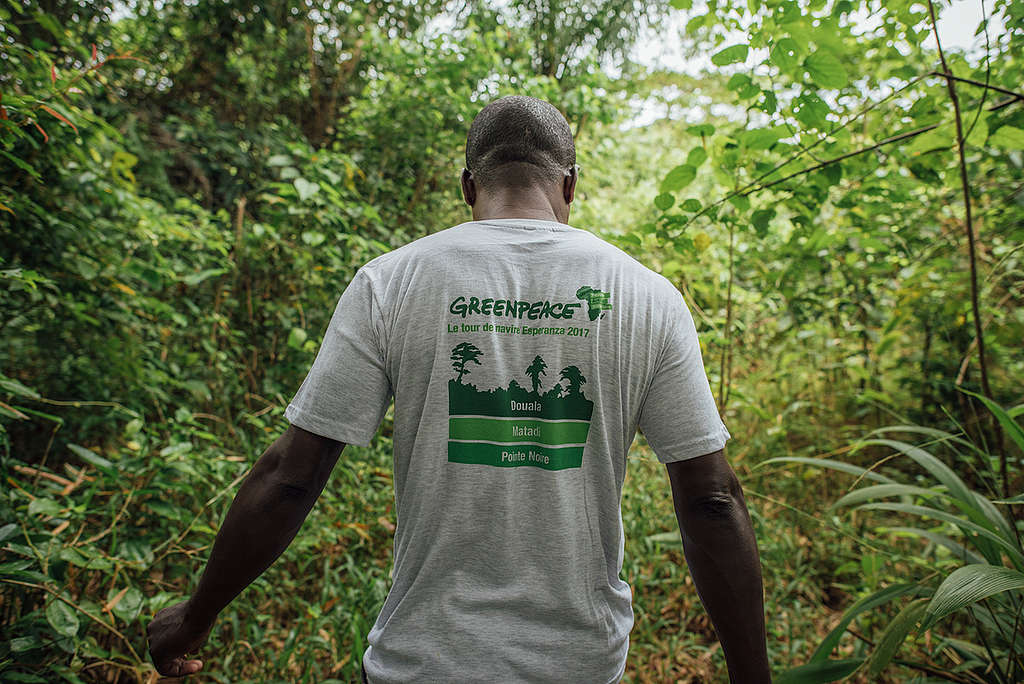Johannesburg, South Africa, 20 March, 2020 — On International Forests Day, Greenpeace Africa published its rejection of corporate and government tree-plantation initiatives to offset emissions, reinforcing the long-term importance of natural ecosystem restoration. The paper details the essential value natural forests have for the climate and biodiversity.
“Companies like Shell, Total, and BP are collectively responsible for some of the most devastating environmental destruction in human history. The idea of treewashing the climate crisis with promises of large tree plantations is anything but benign. Planting tree monocultures with one hand, while the other hand is pumping oil out of the ground, is like putting a bandage on the same arm that is being amputated,” said Greenpeace Germany forests and climate campaigner, Dr. Christoph Thies.
Restoring natural forests and several other “Nature Based Solutions” (NBS), are essential to limit global average temperature increase to below 1.5 degrees above pre-industrial levels. [1] However, Fossil fuel companies and airlines that claim their tree planting initiatives will set their carbon footprints to “carbon neutral” are dangerously misusing the concept of NBS. Climate change deniers in government like US President Donald Trump have recently joined the World Economic Forum’s plan of planting 1 trillion trees. [2] Yet most governments’ commitments for forest restoration end up as monoculture tree plantations producing wood, fiber, rubber, and other commodifications of nature. [3]
“Only a natural forest can be home to rich biodiversity, including rapidly disappearing medicinal plants and a home to Indigenous and local forest communities”, said Greenpeace Africa forest campaigner, Sylvie Djacbou. The solution requires acknowledging their unique role in good management of forests and recognizing their rights over their land, giving them back the forest and ensuring their inclusion in all policies”, added Djacbou.
Natural forests serve as carbon sinks and are home to much terrestrial biodiversity. Forests provide clean air and water, help prevent soil erosion and coastal flooding, and provide livelihoods for Indigenous Peoples “Tree plantations are often a no-go zone for human communities and endangered species. And while they store very little carbon, they definitely seize the media’s attention,” warned Dr. Thies.
“The climate crisis and mass extinction can only be prevented by phasing out the use of fossil fuels and protecting and restoring intact forests. Planting a trillion trees is no solution, it’s a distraction. When misused for offsetting, it’s just accounting tricks.”
“The concept of Nature Based Solutions is being co-opted by corporations and governments who are doubling down on fossil fuels and forest destruction,” said Daniel Brindis, Forests Campaign Director at Greenpeace USA. “Real climate solutions mean saying no to fossil fuels, and restoring and conserving natural forests, as opposed to a system of offsets that act as a lifeline for polluters. “We need real solutions, not treewashing efforts like the Trillion Trees Act.”
The paper’s recommendations include promoting community-based forest management by Indigenous people and local communities, allowing reforestation, avoiding planting monocultures, and rewriting carbon accounting rules against offsets.
ENDS
Digital contents from Greenpeace World Forest Day in Austria, Brazil, Cameroon, China, Indonesia, Poland, Russia, the UK and the USA are available upon request.
Spokespersons available for interviews:
– Dr. Christoph Thies, Greenpeace Germany forests and climate campaigner, available in CET time (English/German).
– Sylvie Djacbou, Greenpeace Africa forest campaigner, available in CET (French).
– Daniel Brindis, Forests Campaign Director for Greenpeace USA, available in PDT (English/Spanish/Portguese).
Notes:
[1] For an overview on NBSs see e.g.: Cohen-Shacham et al (2016). Nature-based solutions to address global societal challenges. IUCN International Union for Conservation of Nature: https://doi.org/10.2305/IUCN.CH.2016.13.en
[2] To protect the environment, days ago I announced that the United States will join the One Trillion Trees Initiative”: www.whitehouse.gov/briefings-statements/remarks-president-trump-state-union-address-3/
[3] Lewis et al (2019). Restoring natural forests is the best way to remove atmospheric carbon. Nature 568, 25–28. https://doi.org/10.1038/d41586-019-01026-8
Contact:
Tal Harris, International Communications Coordinator, Greenpeace Africa, +221-774643195, [email protected]
 Get Involved
Get Involved
